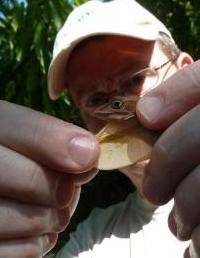Matthew Lovern, Associate Professor of Integrative Biology, Associate Dean of the Graduate College
Animal Behavior, Behavioral Endocrinology, Comparative Physiology
PhD, 2000, Virginia Tech
Email: matt.lovern@okstate.edu
***Dr. Lovern is not currently accepting new students for research***
Specific Interests
I am interested in animal behavior and the developmental, physiological, and social factors that can influence its expression. I and members of my lab primarily work with Anolis lizards to understand endocrine regulation of the development of sex differences, how stress physiology influences agonistic and reproductive behavior, and whether differences in stress responsiveness help to predict why some species are more successful invaders than others. Additionally, I enjoy collaborating on research projects with students and faculty colleagues at OSU and from around the country, as can be seen in the selected publications below.
Selected Publications
- Husak, J.F., Ferguson, H.A., and Lovern, M.B. 2016. Trade-offs among locomotor performance, reproduction, and immunity in lizards. Functional Ecology 30:1665-1674.
- Baird, T.A., Lovern, M.B., and Shine, R. 2014. Heightened aggression and winning contests increase corticosterone but decrease testosterone in male Australian water dragons. Hormones and Behavior 66:393-400.
- Cox, R.M., Lovern, M.B., and Calsbeek, R. 2014. Experimentally decoupling reproductive investment from energy storage to test the functional basis of a life-history trade-off. Journal of Animal Ecology 83:888-898.
- Husak, J.F., and Lovern, M.B. 2014. Variation in steroid hormone levels among Caribbean Anolis lizards: endocrine system convergence? Hormones and Behavior 65:408-415.
- Warner, D.A., and Lovern, M.B. 2014. The maternal environment affects offspring viability via an indirect effect of yolk investment on offspring size. Physiological and Biochemical Zoology 87:276-287.
- Wack, C.L., DuRant, S.E., Hopkins, W.A., Lovern, M.B., Feldhoff, R.C., and Woodley, S.K. 2012. Elevated plasma corticosterone increases metabolic rate in a terrestrial salamander. Comparative Biochemistry and Physiology A 161:153-158.
- Ligon, D.B., and Lovern, M.B. 2012. Interspecific variation in temperature effects on embryonic metabolism and development in turtles. ISRN Zoology 2012:1-13.
- Grindstaff, J.L., Lovern, M.B., Burtka, J.L., and Hallmark-Sharber, A. 2012. Structural coloration signals condition, parental investment, and circulating hormone levels in Eastern bluebirds (Sialia sialis). Journal of Comparative Physiology A 198:625-637.
- Lovern, M.B. 2011. Hormones and reproductive cycles in lizards. In Hormones and Reproduction of Vertebrates, Vol. 3, Reptiles (D.O. Norris and K.H. Lopez, eds.). Academic Press, New York, pp. 321-353.
- Lovern, M. B., and Adams, A. L. 2008. The effects of diet on plasma and yolk steroids in lizards (Anolis carolinensis). Integrative and Comparative Biology 48:428-436.
- Wack, C. L., Fox, S. F., Hellgren, E. C., and Lovern, M. B. 2008. Effects of sex, age, and season on plasma steroids in free-ranging Texas horned lizards (Phrynosoma cornutum). General and Comparative Endocrinology 155:589-596.
- Warner, D. A., Lovern, M. B., and Shine, R. 2007. Maternal nutrition affects reproductive output and sex allocation in a lizard with environmental sex determination. Proceedings of the Royal Society B: Biological Sciences 274:883-890.

